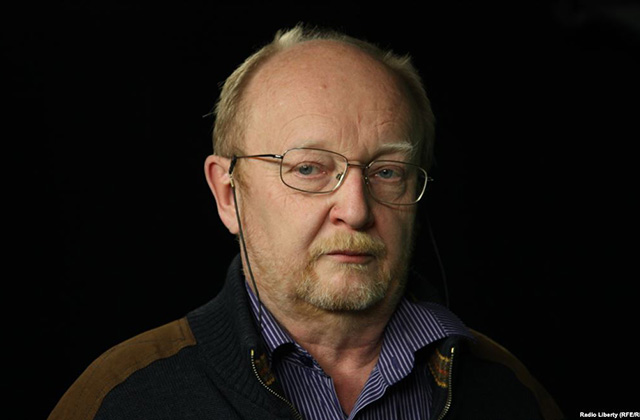“After liberation of Aleppo peace isn’t being shaped in Syria”

On November 29 Syria’s governmental troops liberated Eastern Aleppo with the help of Russian air power. Russian Defense Ministry, guided by the data of Russian Center for Reconciliation of parties to the conflict in Syria, issued a statement, which reads, “The territory of the city has been totally liberated from the terrorists, where the population is more than 90 thousand.”
Later on this information was confirmed by Syrian state TV Channel. It should also be noted, that the Kremlin bothered about the recent statement by Turkish president Recep Tayyip Erdogan that Turkish forces are in Syria to establish justice and collapse Assad’s regime. Although it’s also noteworthy, that Turkish president has changed accentuations of the statement, causing turmoil. “Target of the Euphrates Shield isn’t a clear country or a person, but terrorist groups. No one should cast doubt on it,” Erdogan said in Ankara.
Viktor Nadein-Ravesky, Russian Turkologist and orientalist, reflecting to the new realities developing in Syrian crisis, stated that the situation in Syria won’t be settled in near future, as all the sides are consistent in their positions.
“Its vivid proof was the recent statement by Turkey’s president Recep Tayyip Erdogan, that Turkish forces are in Syria to collapse Assad’s regime, for which the Kremlin demanded explanation. Seemingly, Russia-Turkey rapprochement should have been considerably smoothened discordances between Russia and Turkey in Syria as well, as Russia’s policy is directed to maintenance of Assad’s regime and Syria’s territorial integrity. Surely, this statement raised some questions, which was clarified during Putin-Erdogan telephone conversation, where Turkish president also stressed, that he appears in favor of Syria’s territorial integrity.
We should take into consideration that Erdogan is a dual and sensitive figure, which particularly in Syria’s case is even comprehensible, as a few days ago attack was recorded on Turkish forces. This bothers Ankara as well. However, it became clear from the telephone conversation that in some issues there is even a concord, and cooperation of two forces in Syria is not even excluded. This facilitates further course of the crisis, as, seemingly Turkey and Russia have separated zones of influence in Syria.
Besides that, as time showed, Turkey and Russia may go to concessions in Syria, as price for the worsening of relations is more expensive,” the Turkologist said, adding that nothing depends on Russia and Turkey alone in Syria.
In his words, the forthcoming month will be decisive for the course of Syrian crisis, as Syrian national army aimed to liberate Aleppo, however, it’s not known how the things will develop. “One thing is clear, that due to the Syrian crisis Russia-Turkey relations will be no more tense, which will provide certain stability in Syria, and the forthcoming month will show how the other forces will manifest themselves,” Nadein-Raevsky said.
In his turn, Alexey Malashenko, member of the Scientific Council of the Moscow Carnegie Center, political analyst, stated that the developments in Syria have acquired such a strength of frontal collisions, that currently concession of any side will be a sign of weakness or a defeat.
He considers that it’s difficult to anticipate how the Syrian scenarios will proceed. “I anticipate a few variants. According to the first of them, the ongoing situation will last long, as after the development in Syria initiated by Russia it seemed that the conflict will be a breakthrough, as Assad’s regime will record a speedy victory due to Russian air forces, by weakening the armed groups, however, it didn’t occur. Russia isn’t ready, this means that the situation may yet last long.
The second way, in my opinion, is optimistic, pursuant which the sides will come to stabile ceasefire and will sign a coalition for the transitional stage, which will include all Syrian powers. However, this, let me mention again, is an optimistic scenario, in which it’s a bit difficult to imagine cooperation between Assad and radical opposition, however, it isn’t excluded.
Essence of the third scenario is Assad’s escape, after which the crisis will more intensify, as no matter whom he’ll intend to pass the power, he won’t have that authority to be acceptable for all the sides, which will again lead to a civil war. In fact, the situation gives a reason for rather pessimistic anticipations: Syria is divided into different territories, it’s not clear how Kurdish issue will be settled,” Malashenko said.
According to the latter, the situation is pessimistic from the perspective of relations of the leading powers as well. According to the orientalist, it isn’t excluded that Trump-Putin cooperation will succeed in Syria, however, it’ll be with the tendency of reduction of responsibility of the U.S., in case of which it’ll lie on Russia. And currently, in his opinion, Russian bears that responsibility and won’t be able to overcome the situation, even by cooperating with the opposition.
“Touching upon Turkey is even useless, as the latter in Syria won’t go against Russia in near future, as its relations with the West have worsened, and Russia today is a crucial figure for Turkey. Days ago the statement made by Erdogan should be recorded among the sensitive ones,” Malashenko said. To the question how these developments will be reflected in the South Caucasus, Malashenko replied that they will have the same effect as in the previous 4-5 years. “I don’t observe influence here. The Middle East, in particular, especially Syria, has its inner logic of development, the same, I consider—the South Caucasus and issues available there,” Malashenko said.
By Araks Martirosyan

























